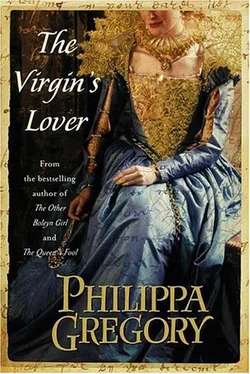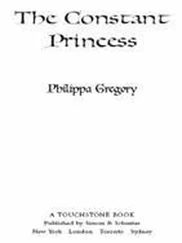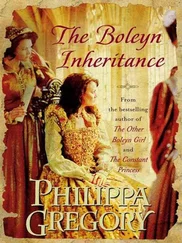They would all have to wait.
“Robert, I cannot bear this alone,” Elizabeth whispered to him. “I am breaking down. I can feel myself breaking down.”
He was walking with her in the long gallery, past the portraits of her father and her grandfather, and the other great monarchs of Europe. Mary of Guise’s portrait glared down at them. Elizabeth had kept it in a place of honor in the hopes of confusing the French about her feelings toward the queen regent who had brought so much trouble to the kingdom and so much danger to Elizabeth.
“You need not bear it alone. You have me.”
She paused in her stride and snatched at his hand. “You swear it? You will never leave me?”
“You know how much I love you.”
She gave an abrupt laugh. “Love! I saw my father love my cousin to desperation and then he ordered her execution. Thomas Seymour swore he loved me and I let him go to his death and never lifted a finger to save him. They came and asked me what I thought of him, and I said nothing in his favor. Not one word. I was an absolute traitor to my love for him. I need more than a promise of love, Robert. I have no reason to trust sweet promises.”
He paused for a moment. “If I was free, I would marry you today.”
“But you are not!” she cried out. “Again and again we come to this. You say that you love me and that you would marry but you cannot, and so I am alone and have to stay alone, and I cannot bear being alone anymore.”
“Wait,” he said, thinking furiously. “There is a way. There is. I could prove my love to you. We could be betrothed. We could make a betrothal de futuro. ”
“A binding promise to wed in public when you are free,” she breathed.
“An oath as binding as the marriage vow,” he reminded her. “One that swears us to each other as surely as marriage. So when I am free, all we do is declare publicly what we have done in private.”
“And you will be my husband, and be always at my side, and never leave me,” she whispered hungrily, stretching out her hand to his. Without hesitation he took it and clasped it in his own.
“Let’s do it now,” Robert whispered. “Right now. In your chapel. With witnesses.”
For a moment he thought he had gone too far and she would withdraw in fear. But she glanced around at the court that was languidly chattering, only half an eye on her strolling with her constant companion.
“Kat, I am going to pray for our troops in Scotland,” she called to Mrs. Ashley. “None of you need come with me but Catherine and Sir Francis. I want to be alone.”
The ladies curtsyed; the gentlemen bowed. Catherine and Francis Knollys followed Elizabeth and Robert as, arm in arm, they went quickly along the gallery together and down the broad flight of stone stairs to the Royal Chapel.
The place was in shadowy silence, empty but for an altar boy polishing the chancel rail.
“You. Out,” Elizabeth said briefly.
“Elizabeth?” Catherine queried.
Elizabeth turned to her cousin, her face alight with joy. “Will you witness our betrothal?” she asked her.
“Betrothal?” Sir Francis repeated, looking at Sir Robert.
“A de futuro betrothal, a pledge to publish our marriage later,” Sir Robert said. “It is the queen’s dearest wish and mine.”
“And what of your wife?” Sir Francis said in a half whisper to Sir Robert.
“She will have a generous settlement,” he replied. “But we want to do this now. Will you be our witnesses or not?”
Catherine and her husband looked at each other. “This is a binding vow,” Catherine said uncertainly. She looked at her husband for guidance.
“We will be your witnesses,” he said; and then he and Catherine silently stood on either side of the queen and her lover as the two of them turned to the altar.
Elizabeth’s Papist candlesticks and crucifix twinkled in the lights of a dozen candle flames. Elizabeth sank to her knees, her eyes on the crucifix, and Robert knelt down beside her.
She turned to face him. “With this ring, I thee wed,” she said. She took her signet ring, her Tudor rose signet ring, off her fourth finger, and held it out to him.
He took it and tried it on his little finger. To their delight it slid on as if it had been made for him. He took off his own ring, the one he used to seal his letters, his father’s ring with the ragged staff and the bear of the Dudley family.
“With this ring I thee wed,” he said. “From today and this day forth I am your betrothed husband.”
Elizabeth took his ring and slid it on her wedding finger. It fitted perfectly. “From today and this day forth I am your betrothed wife,” she whispered. “And I will be bonny and blithe at bed and board.”
“And I will love no one but you till death us do part,” he swore.
“Till death us do part,” she repeated.
Her dark eyes were luminous with tears; when she leaned forward and kissed him on the lips they brimmed over. His memory of that afternoon would always be of the warmth of her lips and the saltiness of her tears.
They feasted that night, and called for music, danced and were merry for the first time in many days. No one knew why Elizabeth and Robert should suddenly be so filled with joy, no one but Catherine and Francis Knollys; and they had withdrawn to their private rooms. Despite the good cheer Elizabeth said she wanted to go early to bed, and she giggled as she said it.
Obediently, the court withdrew, the ladies escorted the queen to her privy chamber and the little traditions of the queen’s bedding began: the ritual thrusting of the sword into her bed, the warming of her nightgown, the mulling of her ale.
There was a quiet tap at the door. Elizabeth nodded that Laetitia should open it.
Cecil’s servant stood there. Mutely he showed a letter. When Laetitia reached for it he twitched it away from her hand. She raised her eyebrows in a fair mimicry of Elizabeth’s impatience and stepped back.
Elizabeth came forward to take it. He bowed.
“How long did it take you to get here?” Elizabeth asked. “How old is this news?”
“Three days, Your Grace,” the man said with another bow. “We have horses waiting down the Great North Road, and my lord has us riding in relays for speed. We’ve got it down to three days. You won’t find anyone gets any news faster than you.”
“Thank you,” Elizabeth said and waved him away. Laetitia shut the door on him and went to stand at Elizabeth’s shoulder.
“You, step back,” Elizabeth said.
Laetitia retreated as Elizabeth broke the seal and spread the letter on her writing table. She had the code locked in a drawer. She started to decode Cecil’s analysis of the use of assassination, then she sat back and smiled as she understood that he was telling her, in his oblique way, that the French were about to lose their outstanding political leader in Scotland.
“Good news?” Laetitia Knollys asked.
“Yes,” Elizabeth said shortly. “I think so.” Bad news for the young Queen of Scots who will lose her mother, she thought. But some of us have had to live without a mother for all our lives. Let her know what it is like to be alone. Let her know that she has to fight for her kingdom as I have had to fight for mine. There will be no pity for the Queen of Scots from me.
As soon as the women had withdrawn, and Elizabeth’s companion was asleep, she rose up from the bed, combed out her hair, and unlocked the secret door between the adjoining rooms. Robert was waiting for her, the table laid for supper, the fire lit. He was struck at once that the color was back in her cheeks, the smile on her lips, and took all the credit for himself.
“You look better,” he said, taking her in his arms and kissing her. “Marriage suits you.”
Читать дальше
Конец ознакомительного отрывка
Купить книгу












